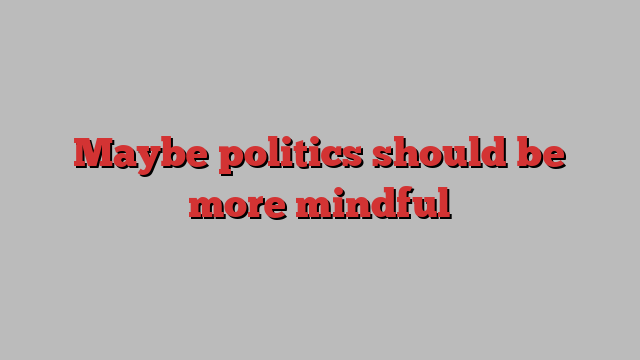
Receive free UK politics updates
We’ll send you a myFT Daily Digest email rounding up the latest UK politics news every morning.
A few weeks ago, I was sent a report by a policy institute called The Mindfulness Initiative, documenting the experiences of a group of British politicians who have undertaken mindfulness training over the past decade. The people behind the report seemed sincere and passionate, and so I tried to take it seriously. But confronted with some eye-roll-worthy lines, I was overwhelmed by an urge to mock it instead.
One Tory MP admits: “Mindfulness . . . actually makes [my] meetings far more efficient because instead of me saying ‘I’m sorry, I didn’t quite understand that point’, i.e. I wasn’t listening, I’m fully focused.” “I’m not claiming that mindfulness will turn you into the next Greta Thunberg, but it might create the space in you to think a little more openly,” says a baroness. The accompanying press release tells us that mindfulness training has helped politicians to “disagree better, engage in more active listening, be more open to different views, and to react less impulsively to situations that are challenging or difficult”.
Part of the problem, I admit, is the word “mindfulness”. It is an ugly, lousy word — and I say this as someone who meditates most days, and regularly practises other “mindful” habits. Not only does it just sound like fluff from the “wellness industry” (shudder, again); it evokes the exact opposite meaning to the intended one: paying attention to the present moment with an attitude of openness and curiosity. “Mindlessness” might be a more accurate description.
But that doesn’t make it a bad idea. Research has shown that members of parliament tend to suffer from higher stress levels and generally poorer mental health than others in a similar pay bracket. Yes, we might dislike some of the jeering and mud-slinging so often on display in the House of Commons, but that doesn’t mean our representatives aren’t worthy of compassion. As Jamie Bristow, a former director of the Mindfulness Initiative and co-author of the paper, points out to me, “we complain about the politicians we have, but we are complicit in eroding their capacity to be the politicians we need”.
Bristow says that mindfulness practices such as meditation and breathing and awareness-building exercises can help alleviate stress, and that stress can “compromise our capacity to take in and process information, consider multiple perspectives, build an accurate picture of the world, regulate emotions, and collaborate and act effectively”. Not what you want from someone making decisions of national importance.
I was struck by the words of the former Tory MP turned podcast host Rory Stewart while promoting his new book, Politics on the Edge. “It’s a horrible, horrible profession, and I think we underestimate the damage it does to your mind, body and soul,” Stewart told the journalist Christiane Amanpour this week. “So many of us become robots; we cease to become private people; we become slogan-spouting machines . . . There’s no room for reflection, and . . . there’s no room for seriousness.”
Being reflective and serious is challenging in a time of such divisive, antagonistic politics. From Brexit to “stolen” US elections, immigration crises to the culture wars, we are living through an era of deep polarisation. So finding ways for leaders to disagree with one another more constructively, and with more empathy for the other side, is crucial.
And at a time when trust in politics is near record lows, authenticity matters too. Bristow points out that populists such as Donald Trump often tend to do better at appearing to speak from the heart and to mean what they say because they care less about the accuracy of their words and manage to be less “trapped in their heads”. Non-populist politicians, Bristow tells me, tend to be too heady, giving them “less of an instinct for understanding the desires and impulses of the irrational emotional beings they are trying to win over”.
This is another area in which mindfulness can help — not just by encouraging politicians to spend less time caught up in their minds, but also to be less reactive and impulse-driven. This, as the report points out, can foster better disagreement and could improve the quality of debate in parliament, by helping politicians to become more aware of their reactions, and perhaps less motivated by animus.
Most obviously, mindfulness can reduce stress, which could lead to better decision-making, and happier individuals in power. As Ashley Weinberg, a psychology lecturer at the University of Salford who has researched the mental health of politicians, points out to me, they are making decisions that affect us all.
Tempers will always run high in public life, just as they do in private. But it would be in everyone’s interests if politics was less shouty, more compassionate — and allowed more space for introspection.